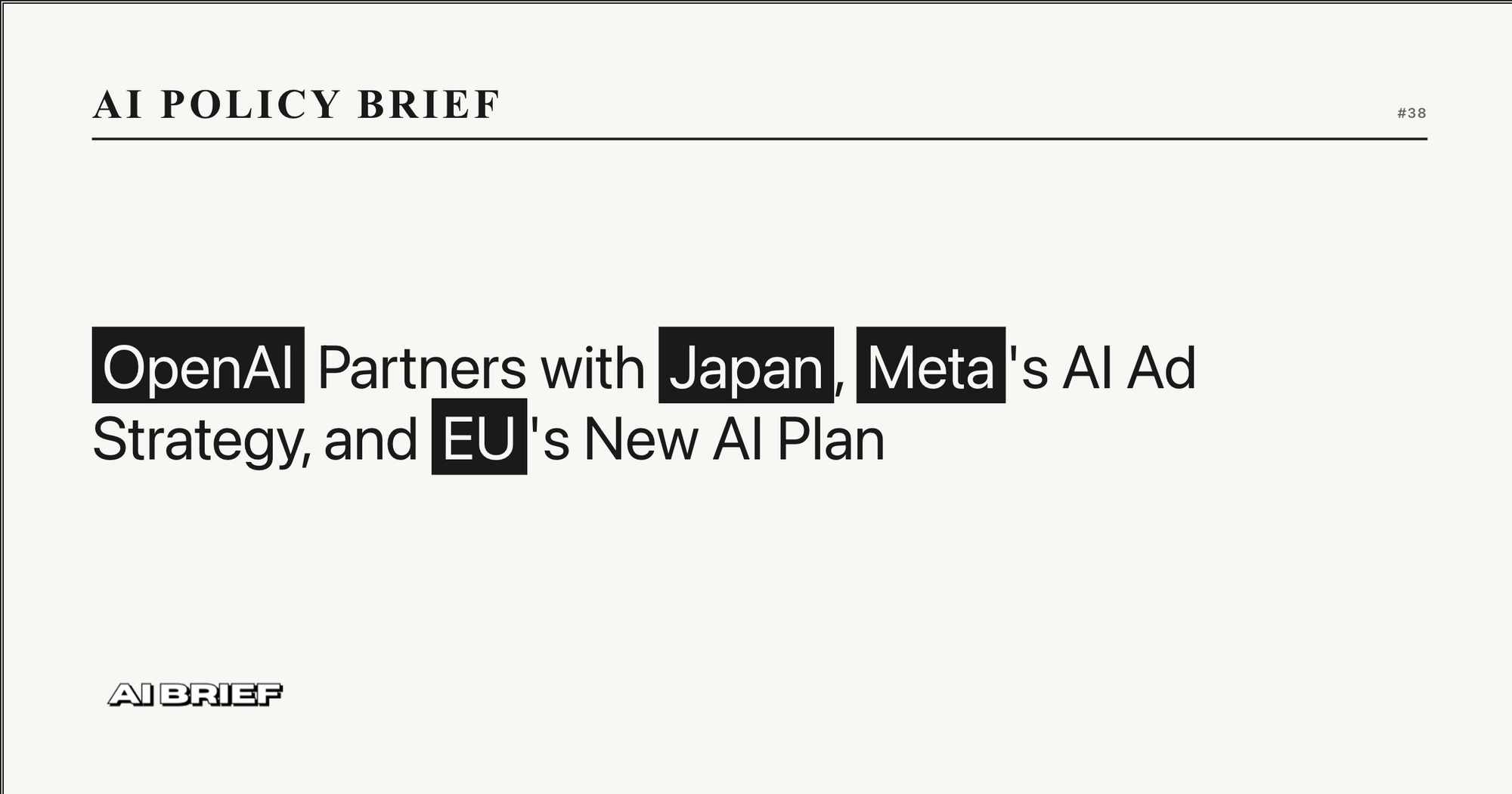
OpenAI Partners with Japan, Meta's AI Ad Strategy, and EU's New AI Plan - AI Policy Brief #38
October 07, 2025 -
AI Policy Brief
Hi there,
Welcome to this week's edition of the AI Policy Brief, your go-to source for the latest developments in AI regulations, safety standards, and government policies worldwide. This week, we're covering a range of topics from international collaborations to new regulatory strategies. OpenAI has partnered with Japan's Digital Agency to explore AI applications in public services, while the European Commission has unveiled a new AI strategy aimed at reducing reliance on the US and China.
In other news, Meta plans to use AI chat data for advertising, sparking discussions on privacy and data usage. Meanwhile, Mexico is gearing up to regulate AI in creative industries, and the Vatican has called for global AI regulation. Stay tuned as we delve into these stories and more, providing you with the insights you need to stay informed in the rapidly evolving world of AI policy.
Welcome to this week's edition of the AI Policy Brief, your go-to source for the latest developments in AI regulations, safety standards, and government policies worldwide. This week, we're covering a range of topics from international collaborations to new regulatory strategies. OpenAI has partnered with Japan's Digital Agency to explore AI applications in public services, while the European Commission has unveiled a new AI strategy aimed at reducing reliance on the US and China.
In other news, Meta plans to use AI chat data for advertising, sparking discussions on privacy and data usage. Meanwhile, Mexico is gearing up to regulate AI in creative industries, and the Vatican has called for global AI regulation. Stay tuned as we delve into these stories and more, providing you with the insights you need to stay informed in the rapidly evolving world of AI policy.
National Policy
AI Policy Brief explores recent developments in AI policy, including Meta's decision to utilize AI chat data for advertising and OpenAI's partnership with Japan's Digital Agency to enhance AI in public services. These moves highlight the evolving landscape of AI integration in global markets.
International Policy
Meta announced plans to use AI chatbot interaction data for ad personalization on Facebook and Instagram starting December 16, 2025, with exceptions for South Korea, the UK, and the EU due to privacy regulations.
OpenAI and Japan’s Digital Agency have formed a strategic partnership to explore the use of generative AI in improving public services in Japan, introducing an AI tool named Gennai for government employees.
OpenAI and Japan’s Digital Agency have formed a strategic partnership to explore the use of generative AI in improving public services in Japan, introducing an AI tool named Gennai for government employees.
- ASML Executive Criticizes EU Accessibility
- Meta to Use AI Chat Data for Ads on Facebook and Instagram
- OpenAI Partners with Japan's Digital Agency
- OpenAI and Allied for Startups Launch AI Report
- Vatican Calls for Global AI Regulation
- Mexico Plans AI Regulation in Creative Industries
- European Commission Reveals AI Strategy to Cut US and China Dependence
Regulatory Actions
California has enacted the Transparency in Frontier Artificial Intelligence Act, mandating increased transparency from large AI developers starting January 1, 2026. Meanwhile, Waymo has received an extension for its autonomous vehicle testing permit in New York City, allowing operations to continue through the end of 2025.
Defense & Security
Meta has announced plans to utilize AI chat data for targeted advertising, marking a significant shift in its data usage strategy. Meanwhile, OpenAI has partnered with Japan's Digital Agency to explore AI applications in public services, aiming to enhance governmental operations through advanced technology.
Innovation & Investment
The Kazakh Government is investing 9.7 billion tenge in 62 AI projects, collaborating with 27 universities and 6 research institutes, and opening a new AI center, Alem.AI, in Astana. Meanwhile, the Department for Work and Pensions has awarded a £9 million contract to IBM to explore and deploy AI systems over the next year.
AI Safety
OpenAI has launched the Sora app, allowing users to create deepfake videos of CEO Sam Altman, currently in an invite-only phase. Meanwhile, a former safety researcher at OpenAI has reviewed a case involving ChatGPT, emphasizing concerns about AI chatbot safety and user support.
Court Cases, Hearings and Lawsuits
Character.AI has removed Disney characters from its platform after receiving a cease-and-desist letter from Disney for copyright infringement. Meanwhile, a report by Gartner predicts a 30% rise in legal disputes for tech companies by 2028 due to AI regulatory violations, highlighting the growing challenges in compliance.
We hope you enjoyed this article.
Consider subscribing to one of our newsletters like AI Policy Brief or Daily AI Brief.
Also, consider following us on social media:
More from: Regulation
02/22
EDGE AI Foundation Forms Defense Working Group for Mission-Critical AI
02/21
Mistral CEO Warns of AI Power Concentration at India Summit
02/21
OpenAI and Microsoft Join UK’s AI Alignment Coalition
02/16
OpenAgent Becomes SEC-Registered Transfer Agent for Tokenized Assets
02/16
US Military Reportedly Used Anthropic’s Claude in Venezuela Raid
More from: Data Protection & Privacy
10/01
Meta to Use AI Chat Data for Targeted Ads on Facebook and Instagram
08/28
Anthropic Introduces Data Sharing Option for AI Training
08/21
Grok Chats Become Publicly Searchable on Google
08/15
PrivacyCheq Introduces aiCheq for AI Privacy Compliance
08/13
O.NE People and Prighter Partner for AI-Driven Privacy Compliance
